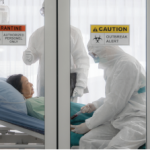A second-year fellow describes the process of searching for a post-fellowship job in rheumatology.


Chen Chao, MD, MBA |
A second-year fellow describes the process of searching for a post-fellowship job in rheumatology.

Tom Berry, DO |
The transition from being a rheumatology fellow to being in private practice is significant. As I reflect on the past two years, I want to share my observations and begin a conversation about how to prepare rheumatology fellows for careers as practicing rheumatologists. The difference between learning about rheumatology and practicing rheumatology is nuanced. Upon…
Match Day Results Highlight Continued Interest in Adult Rheumatology & Sharp Declines in Pediatric Rheumatology The ACR applauds another successful recruitment season for rheumatology and welcomes an impressive pool of applicants to the specialty. Ninety-nine percent of adult rheumatology positions were filled for the 2024 appointment year as part of the National Resident Matching Program…

I read a lot of essays and, believe it or not, I’ve been known to write a few on occasion as well. The majority of them kind of linger in the back of my mind and are slowly forgotten. The ones that stick with me tend to be the application essays that I scrutinize every…

Renée Bacher |
Editor’s note (March 23, 2022): In 2022, the Division Directors Conference and Program Coordinators Conference will both be part of ACR Education Exchange, held April 28–May 1 in Orlando, Fla. Registration is now open. New fellowship program directors often step into the role with little in the way of training, resources or mentoring. That’s where…

Adam Kilian, MD, & Bethany Marston, MD |
In response to the COVID-19 pandemic, all rheumatology fellowship interviews conducted in the 2020 fellowship recruitment season were conducted in a virtual, video-based format to reduce the risks associated with travel and face-to-face meetings. In June 2020, the Coalition for Physician Accountability released guidance suggesting all programs commit to online-only interviews and recruitment events, even…

The desire for safety during the COVID-19 pandemic has forced rheumatology fellowship programs to embrace virtual platforms. Here are some insights into how this change has affected recruitment in 2020.

Nicole K. Zagelbaum Ward, DO, MPH, with Richard S. Panush, MD, MACP, MACR |
Some have opined, cynically, that transformative changes will not come to medical education and training, and to healthcare, until pigs fly. Well, in 2009–10, “swine flu,” and now we are in the midst of an unprecedented and disruptive pandemic, affecting virtually all aspects of our lives, including fellowships.1 As someone who started a rheumatology fellowship…

Bethany Marston, MD, & Jason Kolfenbach, MD |
For most doctors, fellowship training represents the final two to three years of formal medical education, and recognition of the unique opportunities of this time period can help aspiring rheumatologists get the most out of their fellowship. Fellowship training is inherently different than residency training, with less structured time, smaller teams (often consisting of only…

If you’re a rheumatologist, you likely remember the moment of truth on your match day—the day of revelation, when the complex computer algorithm set up by the National Resident Matching Program (NRMP) accommodates the wishes of programs and applicants and then discloses into which program an applicant has been placed. Although it has always been…